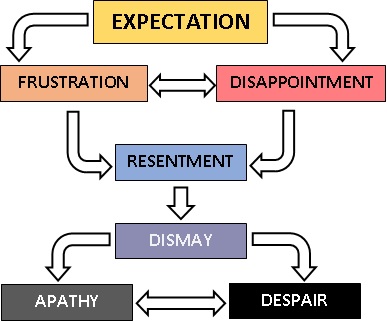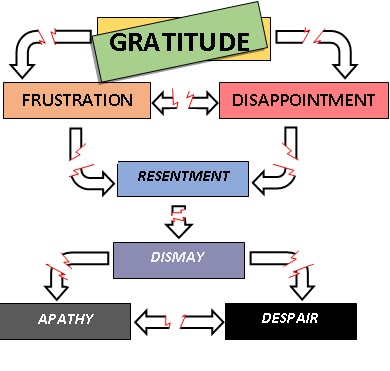
A Coaching Power Tool Created by Camille Gold
(Communication and Relationships Coach, UNITED STATES)
The Dangerous Power of Expectation
Expectations were like fine pottery. The harder you held them, the more likely they were to crack. ― Brandon Sanderson, The Way of Kings
With the exception of physical sensation (i.e. not happy when in pain, satisfied after a good meal, etc.) it is not events that cause feelings, but it is the thoughts that generate beliefs about those events that cause feelings. We don’t react directly to an event; we react to our interpretation of the event. This is why our feelings often seem to contract what we might expect if we were simply observing our actions and environment. A person can be terribly sad while eating a delicious meal, or deeply happy while trudging through the rain on a cold day.
Aaron T. Beck, a psychiatrist who studied the relationship between thoughts and feelings for many years, wrote,
A person who is trained to track his thoughts… can observe repeatedly that his interpretation of a situation precedes his emotional response to it. For example, he sees a car heading toward him; then, he thinks, “It is going to hit me,” and feels anxious. Furthermore, when a person changes his appraisal of a situation, his emotional reaction changes. A young woman believed that a friend passed by her without saying hello. She thought, “He’s snubbing me,” and felt sad. After a second glance, she realized that it wasn’t her friend at all and her hurt feelings disappeared.
Most of the thoughts we have are not conclusions from reasoning about events; they are automatic thoughts, habits of thinking that come to us so effortlessly we assume they come from outside our own heads. Expectations fall into this category of habitual, automatic thoughts. Automatic thoughts often become cognitive distortions that sabotage our self-esteem and relationships with others.
Expectations are all around us, and an integral part of life. Some are universal: the sun will rise and set each day; there will be enough food, water, and shelter to sustain life; I will receive kindness from others; etc. Other expectations are more specific to various people and situations: when I turn the key in the ignition of my vehicle it will start; I will be paid a fair wage for my work; my dog will not chew holes in the socks I left on the floor of my bedroom this morning, etc.
Expectations are one of those tricky tools in our lives that have the potential to both build and destroy, like fire, water, love or hope. Some expectations are positive and realistic. Holding an expectation that diligent efforts produce success can motivate and inspire you and help you to identify the progress that you may not have seen before. Conversely, negative and unrealistic expectations that infiltrate our lives such as, “I must be perfect to deserve love,” can destroy our peace and undermine our efforts, like carrying water in a bucket with a gaping hole in the bottom of it.
Dr. John A. Johnson, a professor of psychology at Pennsylvania State University, wrote in his article, “The Psychology of Expectations: Why Unrealistic Expectations are Premeditated Resentments” that
…human beings have a natural tendency to pin their hopes for happiness on fulfilled expectations. There is nothing wrong with this in and of itself, as long as we have good reasons to believe that fulfilling an expectation will make us happy, and we take the necessary steps toward fulfilling those expectations.… The problem of expectation occurs when we expect something to happen without good reasons for that expectation. If I believe that my expectations alone will bring me what I want, I am using magical thinking and setting myself up for disappointment.
Dr. Johnson goes on to say that expectations become exponentially more complicated when they involve other people, “many of us at some point have mistakenly believed that expecting other people to behave the way we want will actually make them behave that way.”
Unrealistic and Unspoken Expectations: Secret Assassins
He was swimming in a sea of other people’s expectations. Men had drowned in seas like that. ― Robert Jordan, New Spring
Expectations on their own are not bad. As noted before, they are powerful tools, but they do have a destructive capacity if mishandled, misused, or disrespected. Just like water, expectations can shape a person and relationships into something beautiful. And, like water, expectations in a relationship are a life-blood. We must have expectations for ourselves and others in order to build. The key is to keep those expectations realistic and clearly communicated. When water follows the outlined pathway of a river, it can create beautiful vistas that feed the soul. But, if the water is left without a clear pathway, it seeps into spaces where it is unwanted, destroys items and structures, and can leave festering rot in its wake. In the same way, when expectations are unrealistic or unspoken, as they so often are, they can be just as destructive to a person or relationships. Again from Dr. Johnson,
My research on moral psychology tells me that expectations among people are often based on an implicit social contract. That is, without actually verbalizing expectations about give-and-take in a relationship, people construct stories in their heads about legitimate expectations of each other. So, people in a relationship have a “deal” in which the specifics of the deal are never really talked about. It is hard for someone to live up to your expectations when they don’t know what they are, but you still might see this failure as a violation of your social contract…. Unspoken expectations are almost guaranteed to go unfulfilled.
 Use this chart as we go through the following case study to see how unspoken and unrealistic expectations can open a pathway not only to resentments but to despair and apathy, a death knell for relationships.
Use this chart as we go through the following case study to see how unspoken and unrealistic expectations can open a pathway not only to resentments but to despair and apathy, a death knell for relationships.
Carrie and Jim were planning to buy a car. Since her university days, Carrie had dreamed of saving up and then experiencing the thrill of paying cash for a vehicle and owning it outright. When she married Jim, she shared this dream with him. After several years, when they were expecting their first baby, Carrie and Jim decided it was time to get a new vehicle that would better accommodate a growing family. Carrie began to look at lower-priced vehicles that would allow them to purchase it outright without financing it through a bank. She expected Jim to be on the same page but became frustrated when Jim disagreed with her plans. He wanted to buy a newer vehicle and was content to finance it and make monthly payments. Carrie felt that her dreams of paying cash for a car were suddenly nullified, thwarted by Jim who she expected to understand her dreams. She felt hurt and disappointed by his lack of support. Jim felt frustrated because he couldn’t understand why Carrie was so upset or why this decision was becoming so difficult for them.
Over time, as this pattern of unmet/unspoken expectations, disappointments, and frustrations continued unchecked, Carrie found herself to be more combative with Jim, “fighting back” by throwing sarcastic comments and unkind jokes at him, especially when they were with family or friends. Jim began to feel resentful toward her (which is defined by Dictionary.com as “the feeling of displeasure or indignation at some act, remark, person, etc., regarded as causing injury or insult”) and started to find more opportunities to spend time at work or alone working on projects at the house. When they did spend time together, Carrie began to utilize ambush listening to collect Jim’s words, information, or ideas and then spring the trap in an ambush to prove a point. Jim began to listen defensively and take any comment as a personal attack from Carrie.
Eventually, Jim and Carrie began, separately, to feel disillusionment, disheartenment, and dismay at the change in their once happy marriage. Jim found that he could co-exist with Carrie only through apathy, and Carrie began to suffer anxiety and depression as a result of the despair she felt as their relationship slowly died.
While this is a sad tale, it is not an uncommon pattern in relationships between spouses, siblings, parents, co-workers, neighbors, or friends. Far too many relationships are left wounded, sickly, and dying as a result of holding on to expectations, especially those that are unrealistic and unspoken. Luckily, there is an antidote to poisonous expectations in the form of gratitude.
Gratitude: the Ultimate Antidote
My expectations were reduced to zero when I was 21. Everything since then has been a bonus.― Stephen W. Hawking, “The Science of Second-Guessing,” (New York Times Magazine Interview, December 12, 2004)
Gratitude is an incredibly empowering tool. From a white paper entitled, “The Science of Gratitude” published by The Greater Good Science Center, there are several benefits to a mindful practice of gratitude, such as:
In a separate study, Joel Wong and Joshua Brown found that gratitude unshackles us from toxic emotions, helps us to be happier and more satisfied with life, trains the brain to be more in tune with experiencing gratitude, and has an overall compounding positive effect.
Robin Stern, Ph.D. and Robert Emmons, a Ph.D. state in “Gratitude Practice Explained,” that “Gratitude is a state of mind that arises when you affirm a good thing in your life that comes from outside yourself, or when you notice and relish little pleasures…. Gratitude is not just a feeling outside of your control that arrives willy-nilly. It’s more like a radio channel: you can choose at any time to tune in. Gratitude acknowledges the connection.” This is one of the key reasons why gratitude acts as an antidote to expectations, particularly those that are unspoken, unrealistic, and unmet. Gratitude is a healing and supportive emotion. Stern and Emmons go on to say that “Grateful people experience more joy, love, and enthusiasm, and they enjoy protection from destructive emotions like envy, greed, and bitterness…. It can give you a deep and steadfast trust that goodness exists, even in the face of uncertainty or suffering.”
 The following chart can show how the application of gratitude can circumvent the slippery slope of expectations as we revisit Carrie and Jim’s story. Carrie is looking at lower-priced vehicles that may not last as long but could be purchased outright without the need for monthly payments. Jim is looking at new and higher-priced vehicles that may last longer for their family as it grows, and he is confident that they can meet the monthly payments. Carrie feels the flash of disappointment and frustration that naturally come as a result of unmet expectations, but she chooses to apply gratitude to the situation. Carrie recognizes that Jim wants what is best for their family which, to him, is a dependable vehicle that will last a long time. She chooses to “tune in” to that gratitude and appreciate his efforts. Jim feels frustrated that Carrie is disappointed in the prospect of a dependable vehicle. Instead of letting that frustration fester and slip into resentment, he chooses to apply gratitude and recognize that Carrie wants to be financially responsible and not place an extra burden on their family unnecessarily. While the decision still needs to be made, they are both in a positive mindset, more humble and less self-serving, and more willing to communicate with each other because they have acknowledged that they are both seeking to achieve the same overall goal: what is best for their family.
The following chart can show how the application of gratitude can circumvent the slippery slope of expectations as we revisit Carrie and Jim’s story. Carrie is looking at lower-priced vehicles that may not last as long but could be purchased outright without the need for monthly payments. Jim is looking at new and higher-priced vehicles that may last longer for their family as it grows, and he is confident that they can meet the monthly payments. Carrie feels the flash of disappointment and frustration that naturally come as a result of unmet expectations, but she chooses to apply gratitude to the situation. Carrie recognizes that Jim wants what is best for their family which, to him, is a dependable vehicle that will last a long time. She chooses to “tune in” to that gratitude and appreciate his efforts. Jim feels frustrated that Carrie is disappointed in the prospect of a dependable vehicle. Instead of letting that frustration fester and slip into resentment, he chooses to apply gratitude and recognize that Carrie wants to be financially responsible and not place an extra burden on their family unnecessarily. While the decision still needs to be made, they are both in a positive mindset, more humble and less self-serving, and more willing to communicate with each other because they have acknowledged that they are both seeking to achieve the same overall goal: what is best for their family.
Coaching Application
Blessed is he who expects nothing, for he shall never be disappointed.― Alexander Pope
Many times, a client who has snagged in a loop of expectation>disappointment>frustration>resentmentmay feel like they’re being tossed in the waves of a rough surf: as soon as they find their footing, they’re hit again with another wave. A mindful coach can help them to identify, notice, contemplate, and/or express gratitude for the people and things in their life. This gratitude can give them the firm footing they need to withstand the waves of disappointment and frustration that come from unmet expectations. Questions such as,
can assist clients in taking stock of where they might be in the negative expectation cycle and identify how gratitude can ground them to what they value most.
Reflection
- What expectations of yourself/others/life might be creating a negative cycle?
- How does gratitude break the cycle of expectation in your life?
- How can a practice of gratitude help a client stay grounded?
- How can a practice of gratitude help a coach stay grounded?
- What structures can be put in place to maintain a practice of gratitude?
References
Beck, A. T. (1979). Emotional Disorders. New York: Meridian.
Dictionary.com. (2019). Resentment. Retrieved December 3, 2019
Joel Wong, J. B. (2017, June 6). How Gratitude Changes You and Your Brain. Retrieved from Greater Good Magazine: https://greatergood.berkeley.edu/article/item/how_gratitude_changes_you_and_your_brain
John Templeton Foundation. (2018). The Science of Gratitude. The Greater Good Science Center, UC Berkley.
Johnson, J. A. (2018, February 17). The Psychology of Expectations: Why Unrealistic Expectations are Premeditated Resentments. Retrieved from Psychology Today: https://www.psychologytoday.com/us/blog/cui-bono/201802/the-psychology-expectations
Miller, K. D. (2019, March 7). 14 Health Benefits of Practicing Gratitude According to Science. Retrieved from PostitivePsychology.com: https://positivepsychology.com/benefits-of-gratitude/
Robin Stern, R. E. (2013). Gratitude Practice Explained. Retrieved from Yale Center for Emotional Intelligence: http://ei.yale.edu/what-is-gratitude/